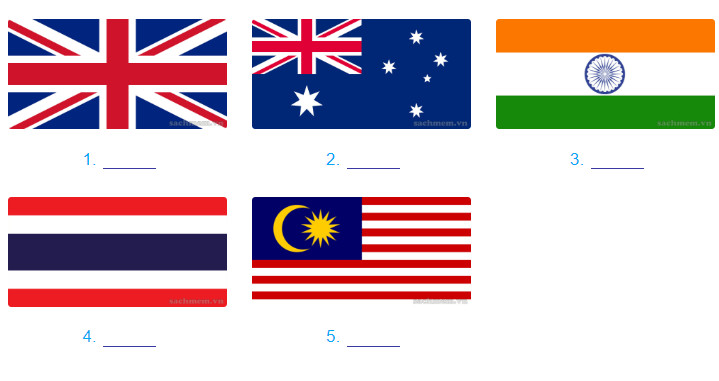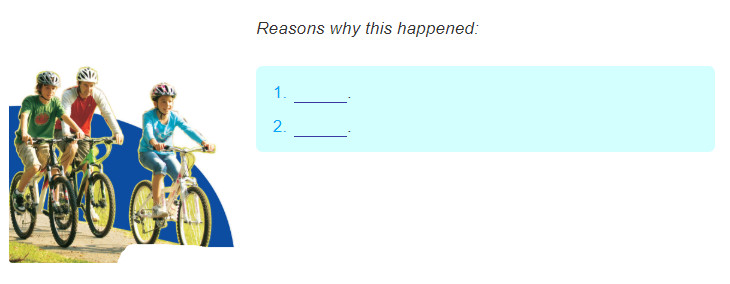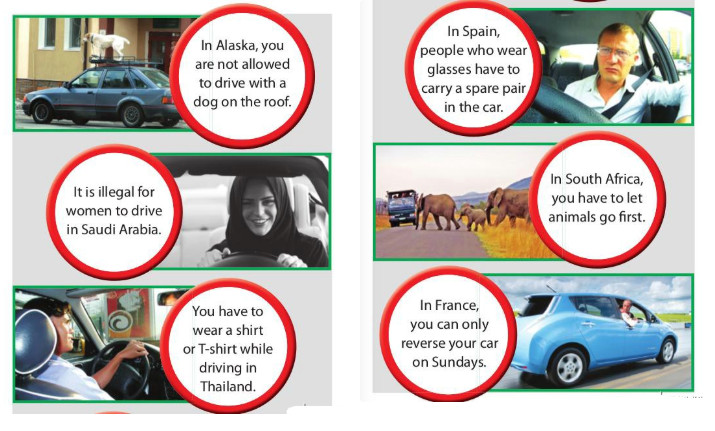Unit 7 lớp 7: Traffic - Communication
Phần Communication - Unit 7 giới thiệu đến các em quốc kì của một số quốc gia, yêu cầu các em nghe lí do một số nước lái xe bên trái và tìm hiểu các luật giao thông kì lạ ở một số ước trên thế giới. Để biết chi tiết, mời các em theo dõi bài học ngay bên dưới.
Mục lục nội dung

Unit 7 lớp 7: Traffic - Communication
1. Task 1 Unit 7 lớp 7 Communication
Look at the flags of some countries. Give the names of these countries. (Nhìn vào những lá cờ của các quốc gia. Đặt tên những quốc gia này cho phù hợp)

Guide to answer
1. the UK (Vương quốc Anh)
2. Australia (Úc)
3. India (Ấn Độ)
4. Thailand (Thái Lan)
5. Malaysia (Ma-lay-si-a)
2. Task 2 Unit 7 lớp 7 Communication
Why do these countries drive on the left? Listen to the text then write your answers below.(Tại sao những quốc gia này lái xe bên trái? Nghe bài văn sau đó viết câu trả lời của em bên dưới)
Click to listen

Guide to answer
1. Some countries use the same system as the UK. (Vài quốc gia sử dụng cùng một hệ thống với Anh.)
2. Many people are right-handed. (Nhiều người thuận tay phải.)
Audio script:
The right side is the wrong side!
Do you know that there are many countries in the world where the traffic rule is to keep to the left? Some of these are the United Kingdom, Australia, India, Thailand, and Malaysia. There are different reasons for this. One is that some countries used the same system as the UK. Another is that many people are right-handed!
Tạm dịch:
Đi bên phải là sai!
Bạn có biết có nhiều quốc gia trên thế giới mà ở đó luật giao thông là đi bên trái không? Một số trong các quóc gia này là Vương quốc Anh, Úc, Ấn Độ, Thái Lan và Ma-lay-si-a. Có nhiều lý do khác nhau cho việc này. Một là một số quốc gia sử dụng cùng một hệ thống như Vương quốc Anh. Lí do khác là nhiều người thuận tay phải!
3. Task 3 Unit 7 lớp 7 Communication
Look at the strange driving laws below. Five of them are true, but one is false. In pairs, can you find the false driving law? (Nhìn vào luật lái xe kỳ lạ bên dưới. Năm trong số chúng là đúng, nhưng một cái là sai. Làm theo cặp, em có thể tìm được luật lái xe sai không?)

Guide to answer
The false driving law: In France, you can only reverse your car on Sundays.
Tạm dịch
- Ở Alaska, bạn không được phép lái xe với một con chó trên nóc xe.
- Phụ nữ lái xe ở Arab-Saudi là phạm luật.
- Bạn phải mặc áo sơ mi hoặc áo thun khi lái xe ở Thái Lan.
- Ở Tây Ban Nha, người mang kính phải mang thêm một cặp kính dự phòng trong xe hơi.
- Ở Nam Phi, bạn phải để động vật đi qua trước.
- Ở Pháp, bạn có thể chỉ lùi xe vào những ngày chủ nhật.
4. Task 4 Unit 7 lớp 7 Communication
Now, work in groups. Discuss the laws and put them in order from the strangest (no 1) the least strange (No 5). Are there strange rules in Viet Nam? (Bây giờ, làm việc theo nhóm. Bàn luận những luật sau và đặt chúng theo thứ tự kỳ lạ nhất (số 1) đến ít kỳ lạ hơn (số 5). Có luật lệ nào kỳ lạ ở Việt Nam không?)
Guide to answer
The strangest law is “You have to wear a shirt or T-shirt while driving in Thailand”. It is a little weird, because the clothes does not influence driver.
The less strange law is “In South Africa, you have to let animals go first” is a little strange, because it shows that the animals are more important to people.
Next, the law “In Spain, people wear glasses have to carry a spare pair in the car.” This law is so strict and unreasonable.
Next, "It’s illegal for women to drive in Saudi Arabi". The law is a little abnormal.
Lastly, the law “In Alaska, you are no: allowed to drive with a dog on the roof.” is rather ok. Because it’s dangerous with the dog on the roof.
Tạm dịch:
Luật kỳ lạ nhất là “Bạn phải mặc áo sơ mi hoặc áo thun trong khi lái xe ở Thái Lan”. Nó hơi kì quặc, bởi vì quần áo không ảnh hưởng gì tới người lái cả.
Luật ít kỳ lạ hơn là luật “Ở Nam Phi, bạn phải để cho động vật đi trước”, hơi kỳ lạ, bởi vì ở đó cho thấy rằng động vật quan trọng hơn con người.
Tiếp theo là luật “Ở Tây Ban Nha, người đeo kính phải mang theo một kính dự phòng trong xe.”. Luật này hơi nghiêm và không hợp lý.
Kế đến, "Ở A Rập Saudi phụ nữ lái xe là phạm luật.” Luật này hơi bất bình thường.
Cuối cùng, luật “Ở Alaska, bạn không được phép lái xe với một con chó trên nóc xe" là khá ổn. Vì để chó trên nóc xe là việc nguy hiểm.
5. Practice Task 1
Supply the correct forrm of verbs in the brackets
1. A bottle was ________ (throw) outsides last night by him.
2. This fan has already ________ (fix) by my father.
3. Now, a test ________ (do) by him to prepare for his exam.
4. Finally, the key ________ (find).
5. They were very worried that the work would not ________(finish).
6. Practice Task 2
Choose the best answers
6. I’m afraid I’ll never (get used to living/used to live/got used to living) in this place. I simply don’t like it and never will.
7. Whenever we came to Coventry we always (used to stay/got used to staying) in the Central Hotel. We loved it.
8. When Pete Smith was the head of our office everything (got used to be/used to be/was used to being) well organized. Now it’s total chaos here.
9. Mr Lazy was shocked when he joined our busy company because he ( wasn’t used to/didn’t use to) doing much work everyday.
10. At first the employees didn’t like the new open-space office, but in the end they (got used to/get used to/are used to) it.
7. Conclusion
Kết thúc bài học, các em cần làm bài tập đầy đủ, nhận biết lá cờ của các nước, nắm được các luật giao thông kì lạ ở các nước trên thế giới và thảo luận tìm ra các giao thông luật kì lạ ở Vệt Nam; đồng thời ghi nhớ các từ vựng trong bài:
- system (n): hệ thống
- right-handed (Adj): thuận tay phải
- illegal (adj): phạm pháp
- reverse (v): lùi
- weird (adj): kì cục
- influence (v): ảnh hưởng
- strict (adj): nặng nề. nghiêm khắc
- unreasonable (adj): không hợp lý
- abnormal (adj): không bình thường
Tham khảo thêm
- doc Unit 7 lớp 7: Traffic - Getting Started
- doc Unit 7 lớp 7: Traffic - A Closer Look 1
- doc Unit 7 lớp 7: Traffic - A Closer Look 2
- doc Unit 7 lớp 7: Traffic - Skills 1
- doc Unit 7 lớp 7: Traffic - Skills 2
- doc Unit 7 lớp 7: Traffic - Looking Back
- doc Unit 7 lớp 7: Traffic - Project




